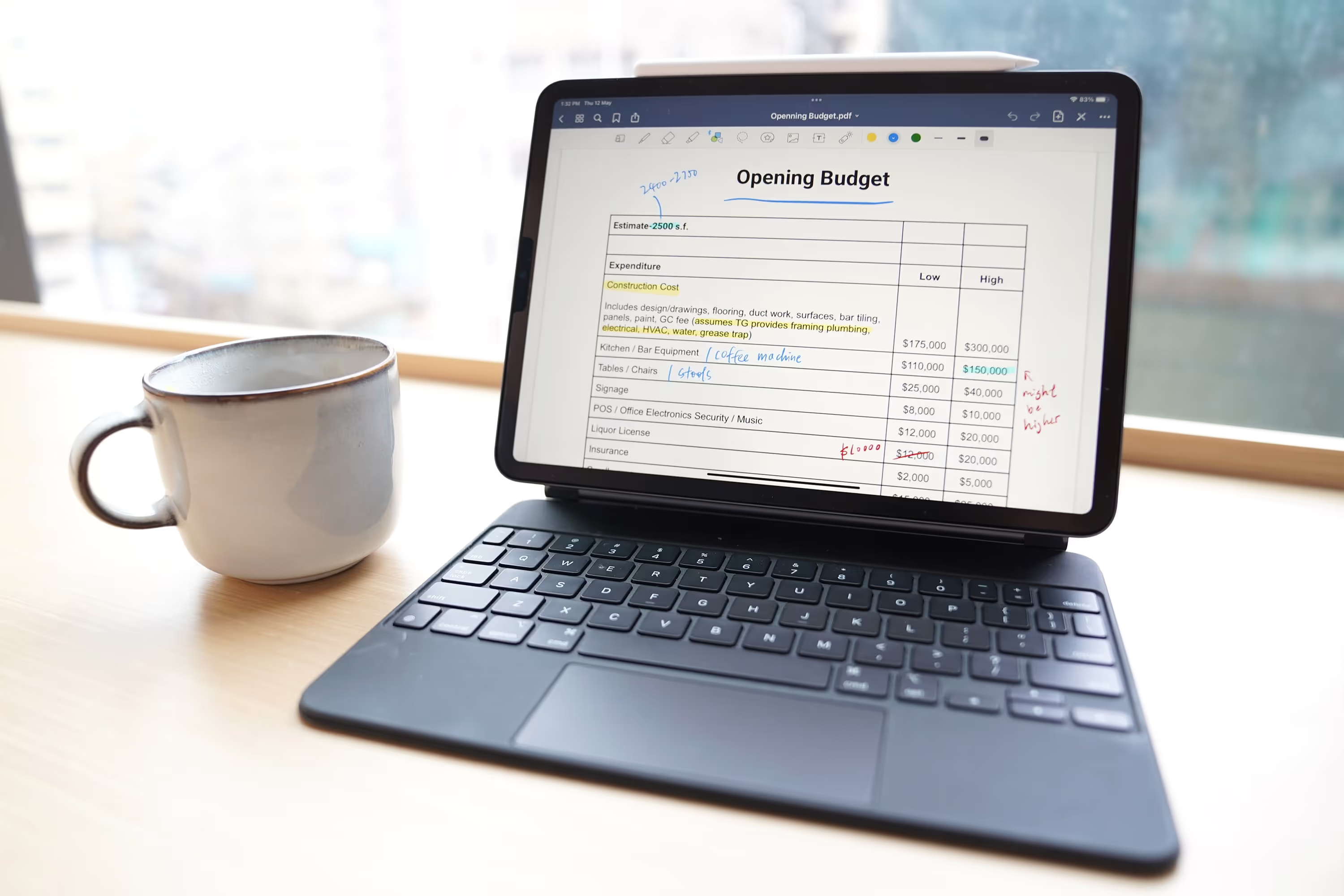Event planning can be an exciting and fulfilling experience, but like anything else, it also comes with stressful moments. Creating a budget for your event is one such challenge—but having a clear and well-thought-out strategy is a great first step that can minimize surprises and help you stay on track.
There are many different ways to approach this, but we've found that breaking down the budget into three phases is a great way to get started. In this comprehensive guide, we'll walk you through a three-phase approach to creating an event budget—from brainstorming to organizing, all the way to implementation.
We've got valuable tips and tricks along the way so that you can stay within costs while getting the most value out of every dollar.
What is an Event Budget, and Why Do You Need One?
Event budgets are an essential part of event planning. An event budget plan is a highly-organized document that allows you to keep track of all expenses related to an event. It can include target costs, budget ranges, and the actual price of services purchased.
Event budgets are helpful because:
- They help you determine the financial scope of your event.
- Tracking event expenses allows you to keep an eye on costs and make sure that you stay within your financial estimate.
- They help you calculate the event's return on investment (ROI) to measure success.
- You may be able to get more funding for your event (or future events) if you have clear financial projections.
Creating a detailed budget document can help you make smarter spending decisions, track success, and keep everyone on the same page. The budget should include all categories related to the event, such as venue rental, catering costs, advertising funds, staff salary, and more. It also allows you to calculate whether or not the event was profitable by comparing actual financial performance versus projections.
Overall, having a comprehensive event budget also ensures that stakeholders are informed about what resources are needed for the successful completion of the project. By understanding where money is being allocated and monitoring expenses throughout the process, everyone involved in organizing the event can manage finances effectively.
A Three-Phase Guide to Creating an Event Budget
Phase 1: Brainstorm the Basics

Before you start planning an event and budgeting for it, it's important first to answer basic questions about the nature and scope of the event. Answering these questions will help you determine your budget category, which will guide all of your future spending decisions and keep them within the confines of your overall scheme.
Here are some essential questions to consider:
What are Your Event Goals and Needs?
The first step in creating a budget is to identify your event’s goals and needs. Thinking through the objectives of your event can help inform how much money will be needed for the event and what kind of budget categories must be included.
Spending some time writing and brainstorming your event goals can help you get a better understanding of what’s essential for your event.
Here are some helpful questions to ask when creating your event budget framework:
- What is the goal or objective of the event?
- How will this event benefit your organization or business?
- How will this event benefit the community it’s taking place in?
- What types of activities are relevant and helpful for this event?
- How do you want the event planners and attendees to feel after the event?
- Are you expecting an event ROI, such as an event profit, or a sign-up for an offering?
- What metric will you use to measure the success of the event? (profit, number of attendees, etc.)
These questions help provide a set of objectives and values that will keep you on the course when you're digging into the numbers. This way, when something doesn't align financially, you can return to these answers to help aid budgetary decision-making.
Tip #1: Seasoned event planners don't start from scratch and research other similar gatherings for an idea of the cost and categories that can be expected. This will give you a better understanding of the costs, budgeting requirements, and potential issues that may arise.
Have You Decided on the Type and Format of Your Event?
How you choose to format and organize your event can make a massive difference in the amount of money it will cost. To start, determine which type of function you would like to host; it could be anything from launching a product, fundraising, or trade shows. Every event has distinctive needs that must be taken into account when making financial decisions.
Different venues will serve different types of events as well. Here are some examples of how diverse a venue may be based on the function of the event:
- Professional development events: Co-working spaces, local universities, library conference rooms.
- Networking events: Lounges and bars, art galleries, museums, or other unique venues.
- Trade shows/conferences: Larger spaces such as exhibition halls or convention centers.
- Fundraisers: Restaurants, country clubs, parks, local recreational centers.
- Neighborhood gatherings: Community centers, block parties, churches, parks, or private homes.
Next, you'll want to consider the format of your event. With so many technological opportunities in the event planning world, you can choose to host in-person, online, or even offer a hybrid event that provides access to both.
In-person events are great for bringing people together and creating a sense of community. They often involve activities such as seminars, workshops, networking sessions, product launches, and more.
Virtual events are more cost-effective and can reach a larger, global audience. They are also better for streamlining the planning process and require fewer logistics.
Hybrid events offer both in-person and online components, allowing you to capture the best of both worlds. You can craft an experience that combines pre-recorded content or live-streaming sessions with activities such as workshops, physical product demonstrations, and more.
Tip #2: If you have an idea of the type and format of your event, reach out to potential venues for a quick chat asking if they're available for the type of event you're planning. This will give you a soft introduction and a better understanding of the venues and their rules.
Phase 2: Estimate Expenses

Now that you have a good idea of where you'll be hosting the event and what type of format you'll use for programming, you can start to get into the nitty-gritty details. Start by deciding which spending categories are relevant to your event and start making broad estimates.
Having a good idea of each category's estimated cost is essential for developing a realistic budget.
Keep in mind that there may be additional expenses that don't fall into the direct event categories, such as insurance, permit fees, and taxes. You'll want to take note of these as well to make sure that you have a realistic expectation of what needs to be allocated for your event.
Tip #3: Crafting an event budget takes careful consideration; don't settle for one vendor's prices. Explore different vendors and use the competition to your advantage so you can get the best deal!
Common Event Budget Expenses Every Event Planner Should Consider
To effectively categorize your event expenses, it's crucial to understand the difference between fixed costs and variable costs. Fixed costs are expenses that remain constant regardless of attendance, while variable costs fluctuate with attendance levels. Here's a breakdown of each type of cost:
- Fixed expenses: These are costs that don't change, such as venue rental fees, event insurance, permits, and licensing fees.
- Variable expenses: These costs vary based on attendance and can include catering expenses, entertainment costs, and promotional materials.
Another important consideration is to decide whether or not an expense is essential or not. For example, gifts or swag bags may be a nice additional touch to your event, but they may not be necessary when it comes to the overall event objective. Noting this when brainstorming expenses can let you know where you have wiggle room if the budget gets tight.
Now, let's break down some of the most common event expenses that planners come across:
- Venue rentals: Unless you're hosting the event at your own professional or personal space, you’ll need to factor in the cost of renting a space. This expense will vary depending on your location, the size of the event, and how long you will need to rent the space.
- Food and beverage: This is an important factor for most events and has a wide range of potential costs. You may have food and drink donated by a local restaurant, provide snacks, or even have an event catered for an elevated experience.
- Audio-visual and technical equipment: Depending on the type of event you’re planning, you may need to rent or buy audio-visual equipment such as microphones, speakers, projectors, and other technical equipment. Check-in to see what your venue already has before you decide to bring in additional equipment.
- Entertainment: If you’re hosting a special event, such as a holiday party or a fundraiser, it's essential to have the right entertainment that reflects your event’s theme. This could include hiring a band, DJs, comedians, or magicians.
- Decor: If you plan on theming your event, you'll need to consider the decorations. This includes centerpieces, flowers, balloons, banners, and more.
- Marketing: A major cost in planning an event is marketing and promotion. This includes creating a website, developing print materials, and running social media or advertising campaigns.
- Staffing: Some events require staffing which can range from security personnel to bartenders and servers.
- Swag bags: If you plan on giving out gifts or swag to attendees, you'll need to consider the cost of these items. Gifts can range from prizes to swag bags to event-branded promotional items.
By breaking down your event budget into smaller categories, not only can you get clear on what you need to buy, but you also create an organized template that can help you break your expenses into more manageable chunks.
Remember to Factor in Taxes!
There's nothing worse than going over budget due to forgotten taxes. All of your expenses need to include any applicable taxes like sales tax, service fees, and more. Your organization's specific tax structure may also be applicable and should also be taken into account.
Depending on the type of event, different taxes may be applicable. Here are some of the most common add-on expenses that event planners should consider when creating a budget:
- Sales Tax: Sales tax applies to goods and services (like meals, alcohol, and entertainment) sold at the event. The rate varies depending on your location an can be looked up online.
- Sales Tax Exemption: Some organizations and non-profit events may qualify for a tax exemption. This is when your organization doesn’t have to pay the applicable taxes for goods and services purchased for the event. Check with your local state or governing body to see if you qualify for this.
- Service Fees: Service fees can range from fees for using a credit card to fees charged by the venue or catering company. Some fees include the cost of labor, setup, and delivery. Make sure you check your contract to see if any of these fees are included or if you need to factor them in separately.
Tip #4: Inflation can take a toll on our yearly budget, so it's essential to plan ahead and anticipate that expenses may be higher than in previous years. Make it a routine to incrementally increase your budget by a few percentages each year to offset any unforeseen cost increases.
Plan For the Unexpected
Even the most experienced event planners encounter unexpected costs and setbacks. Creating a contingency percentage of your event budget is essential in order to cover any unexpected costs and programming setbacks. A good rule of thumb is to set aside an additional 10-20% of your budget as an allowance for any unforeseen costs.
You can also think of a backup plan for the programming itself. For example, if a speaker cancels, you could have a pre-recorded presentation and a projector on hand to patch through.
Phase 3: Finishing Touches

Creating an event budget isn't only about tracking the expenses for your gathering. There are plenty of other financial details to attend to, such as finding sources of funding, identifying the amount of money available in any discretionary funds, calculating your projected profits and losses, and more.
After outlining the goals of your event, it's critical to assess how you will finance them and explore various ways to monetize your gathering.
Determine the Funding Sources
The next step in organizing your budget for your event is to figure out where you will source the money from. Some ways you may be able to offset your event's expenses include:
- Event sponsorships
- Ticket sales
- Grants
- Leveraging bulk/corporate/non-profit discounts
- Fundraising
- Paying preallocated funds
- Financing or loans
You may seek funding from one or more of these sources, so take time to think about how much money each one will provide and how it will affect your overall event budget.
Some of these may take more time to secure, like event sponsorships and grants, so you need to plan for that and make sure to include any necessary timelines in your budget as well.
Once you have your funding sources in mind, it's time to start reaching out to potential sponsors and partners, as well as researching grants or other options for monetizing your event.
You'll need to make sure you have a strong message and proof of the ROI you will offer potential partners to secure the collaborations.
Will You Charge Admission Fees for Your Event?
The next step in creating an event budget is deciding if you are going to charge for your event. There are a few different ways you can go about choosing how much to charge for your event, and each approach will affect your overall budgetary needs. These three types of event ticket pricing include:
- Fixed Ticket Prices: This is when attendees pay a set fee for tickets. The ticket cost would provide access to all of the included activities and features, as well as any associated taxes or fees. The price of a fixed-cost ticket is usually determined by the event's budget and the potential demand for tickets.
- Tiered Pricing: Tiered pricing offers different ticket prices for different levels of access. For example, a $20 ticket may only provide entry to an event, while a $50 ticket may include access to exclusive speakers and workshops. This method provides "up-selling" opportunities that can increase your event's revenue.
- Donation-based Pricing: Also known as a sliding-scale cost. This is when attendees can donate whatever they feel comfortable paying. You may choose to offer some additional benefits to very high-level ticket purchasers, but in general, within a certain price range (i.e., $10 to $60), no matter what someone donates, they will get the same access and experience.
Once you determine how much to charge (or not charge) for tickets, you will need to decide what percentage of your event budget should come from ticket sales and factor that into your overall budget.
With fixed ticket prices, it will be fairly predictable to know how much money you'll have towards the budget, especially if attendees register and pay in advance.
While tiered and donation-based pricing structures have the potential for higher earnings, they're also more unpredictable and can be difficult to budget for.
Regardless of which approach you ultimately choose, make sure to include all associated fees in your budget. This includes ticketing fees, taxes, payment processing fees, and any other expenses related to the event's financials.
If you want to avoid charging your attendees, you can focus on alternative sources of funding mentioned above, such as sponsorships or donations.
Tip #5: Once your event has come to a close, it's time to evaluate the effectiveness of your budget, review any unexpected expenses, and determine whether or not you received an appropriate return on investment. This way, the next time you plan an event, you can use the data from this one to create a better experience.
Is Your Technology Stack Ready for Your Next Event?
Now that you've completed your first event budget and are ready to plan your next one, it's time to consider the program you'll use to manage your event.
The Bevy Conference Platform is a great choice for any event planner or organizer looking for a reliable and comprehensive event conferencing system. With built-in features like Q&A, chat, breakout rooms, DMs, and more, you can easily maintain continuous engagement with your audience. So, if you're looking to create the best experience possible, Bevy's virtual conference platform can help.

